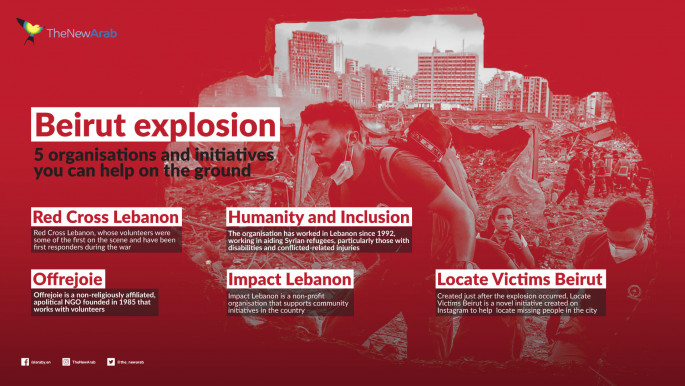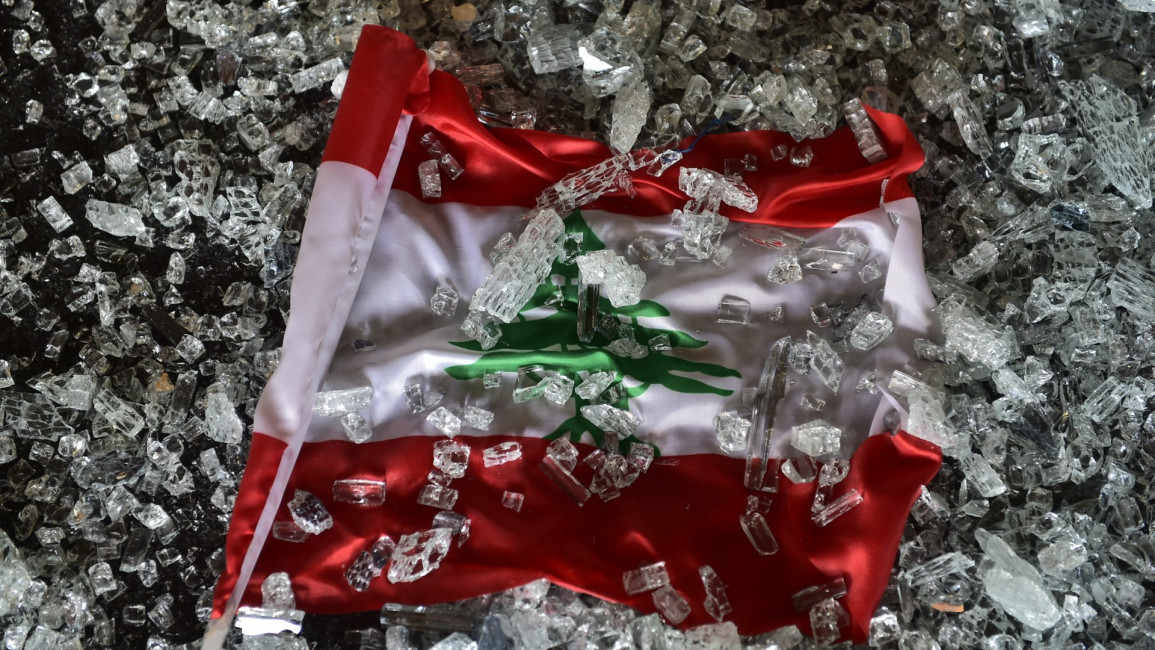Beirut Explosion: Here are 5 organisations and initiatives you can help on the ground
Scores of people died after an explosion ripped through Lebanon’s capital city of Beirut, and as the dust clears, thousands are injured and hundreds of thousands of people have found themselves homeless.
Aid groups heaving with volunteers work hard to offer relief, support, and housing as the country reels from one of the worst disasters in its history.
Seismologists measured the event, which blew out windows at the city's international airport nine kilometres (more than five miles) away, as the equivalent of a 3.3-magnitude earthquake.
The scale of the destruction was such that the Lebanese capital resembled the scene of an earthquake, and aid workers and volunteers are working overtime to help those in need.
"We’ve had some dark days in Lebanon over the years but this is something else," said Rami Rifai, a 38-year-old engineer, speaking to AFP from a hospital where his two daughters were receiving treatment after sustaining cuts despite being half a kilometre from the seat of the blast.
"We already had the economic crisis, a government of thieves and coronavirus. I didn't think it could get worse but now I don't know if this country can get up again. Everyone is going to try to leave. I will try to leave," he said.
There are countless organisations supporting the city in this dark time. The following is not an exhaustive list, but rather an important snapshot into the grassroots work being done.
1. Red Cross Lebanon
Leading the charge is Red Cross Lebanon, whose volunteers were some of the first on the scene and have been first responders during the war.
|
The organisation has set up triage and first aid stations to help victims of the blast with non-critical injuries in a number of areas across the city, including Martyrs Square and Forum De Beyrouth.
Red Cross ambulances were some of the first on the scene to offer aid, along with 375 EMTs and staff.
The organisation also helped evacuate intensive care patients from St George’s Hospital in Beirut, and facilitated the collection of blood donations and transfusions at centres across the city.
You can donate to Red Cross Lebanon here.
2. Impact Lebanon
Impact Lebanon is a non-profit organisation that supports community initiatives in the country.
The organisation is fundraising disaster relief through the crowdfunding site JustGiving.
It has raised £2,847,700 ($3,738,389) in a few short days, and plans to use the funds to help relief efforts in the damaged city.
“Another disaster has hit Beirut today. We are all in shock witnessing the massive explosion that happened at the sea port of Beirut on 4 August 2020,” the fundraising page reads.
“The extent of the damages is devastating. Beirut tonight sleeps wounded and on shattered glass and rubble.
“Our people in Lebanon have been suffering through a difficult financial crisis and the Covid-19 pandemic.
“We are calling on the world, our friends, our fellow Lebanese in the diaspora to donate to this relief fund.
“No amount is too small. We are coordinating with NGOs who will need our help and we will update the page providing exact details on how your money will be spent."
You can donate to Impact Lebanon here.
3. Humanity and Inclusion
The organisation has worked in Lebanon since 1992, working in aiding Syrian refugees, particularly those with disabilities and conflicted-related injuries.
|
Its 100-person Lebanon team is gathering information from hospitals to prepare a response, in particular rehabilitation & psycho-social needs.
The team of experts are set to offer rehabilitation services and post-surgical physical therapy.
You can donate to Humanity and Inclusion here.
4. Offrejoie
Offrejoie is a non-religiously affiliated, apolitical NGO founded in 1985 that works with volunteers.
The organisation has a two-pronged approach to the explosion; They are calling on volunteers to aid in relief efforts, and they are asking for funding to help clean and rehabilitate houses impacted by the explosion.
Volunteers work with the organisation to host families in centres in Kfifan and Maad. They have also helped to clean, cook, gather supplies and rehabilitate houses that have been damaged.
You can donate to Offrejoie here.
5. Locate Victims Beirut
Created just after the explosion occurred, Locate Victims Beirut is a novel initiative created on Instagram to help locate missing people in the city.
Volunteers are utilising the social networking platform to share information about missing persons, to encourage those who have located them to write in, and provide as much information as possible about the last places such people were seen.
Security forces sealed off an area around the blast site and have been searching for survivors under the rubble.
Their efforts however, were slowed down overnight due to lack of electricity.
 |
As the death toll inches higher, and rescue workers search for dozens of missing people, the platform provides relief for those whose friends or family members are missing.
You can take a look and share information about missing persons on its Instagram page here.
As Beirut struggles to breathe, people call explosion 'criminal negligence'
Lebanon's Prime Minister Hassan Diab said 2,750 tonnes of ammonium nitrate, an agricultural fertiliser, stored in a portside warehouse had blown up, sparking "a disaster in every sense of the word".
Read more: Beirut Explosion: Be angry, not just sad, for Lebanon
Initial investigations indicate “years of inaction and negligence” over the storage of ammonium nitrate, with one Lebanese official telling Reuters that storage safety issue had been before several committees and judges and “nothing was done” to issue an order to remove the highly combustible material.
Badri Daher, Director General of Lebanese Customs, told broadcaster LBCI on Wednesday that customs had sent six documents to the judiciary warning that the material posed a danger.
“We requested that it be re-exported but that did not happen. We leave it to the experts and those concerned to determine why,” Daher said.
A source close to a port employee said a team had inspected the ammonium nitrate six months ago, and warned if it was not moved it would “blow up all of Beirut”.

![Members of the Algerian delegation threw roses into the Seine [Getty]](/sites/default/files/styles/image_330x185/public/2024-07/GettyImages-2162980872.jpg?h=199d8c1f&itok=h_3o_TOL)

![The Libyans were arrested at a farm in Mpumalanga province east of Johannesburg [Getty]](/sites/default/files/styles/image_330x185/public/2024-07/GettyImages-2162903568.jpg?h=199d8c1f&itok=4Qzg79i1)